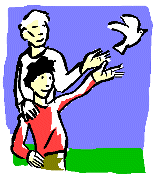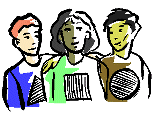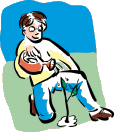|





 The 8 keys of a Culture of Peace
The 8 keys of a Culture of Peace
Education for Peace
Learning attitudes and skills that help us to live
together.
Free Flow of Information
Giving everybody a chance to learn and share all
knowledge.
Respect for Human Rights
Treating others as you would like to be treated.
Tolerance and Solidarity
Understanding and appreciating how people are different
and how we can all help each other.
Gender equality
Ensuring an equal place for men and women in building
society.
Sustainable Development
Insure and install the conditions of a real progress by
offering to all tools of development which respect the
different human communities and their environment.
Democracy
Making decisions by having your say and giving others
theirs.
Refusing Violence
Acting peacefully and using conviction, listening and
understanding for obtaining justice and equity.
Education for Peace
Learning attitudes and skills that help us to live
together.
 In the past a lot of our education has been about war,
about how countries were conquered and the outcome of
battles. Now all the people of the world, and especially
children and young people needs to learn about how to build a
culture of peace. This means learning how to deal with
differences without fighting or using force. We need to learn
to live in harmony and to work together for a better world.
Sometimes young people look at the situation of the world and
feel overwhelmed by the size of problems. However, learning
about peaceful ways to resolve problems can be the first step
to changing the world. Children and young people may learn to
live by the principles of a culture of peace in the
classroom, in the playground, in scouting and in the
neighbourhood. The skills and attitudes they learn can then
be used on a wider scale to change relationships in work
places, national governments and international relationships.
In the past a lot of our education has been about war,
about how countries were conquered and the outcome of
battles. Now all the people of the world, and especially
children and young people needs to learn about how to build a
culture of peace. This means learning how to deal with
differences without fighting or using force. We need to learn
to live in harmony and to work together for a better world.
Sometimes young people look at the situation of the world and
feel overwhelmed by the size of problems. However, learning
about peaceful ways to resolve problems can be the first step
to changing the world. Children and young people may learn to
live by the principles of a culture of peace in the
classroom, in the playground, in scouting and in the
neighbourhood. The skills and attitudes they learn can then
be used on a wider scale to change relationships in work
places, national governments and international relationships.
Do you know other examples to describe this key?
Send us a message!
Free Flow of Information
Giving everybody a chance to learn and share all
knowledge.
 In our modern world information is very important.
Some people have better access to information than others
and this is not very fair. For example, during a tracking
the team that learned to use a map and a compass will easily
reach the goal.
In our modern world information is very important.
Some people have better access to information than others
and this is not very fair. For example, during a tracking
the team that learned to use a map and a compass will easily
reach the goal.
Do you know other examples to describe this key?
Send us a message!
Respect for Human Rights
Treating others as you would like to be treated.
 It is important to treat others with the same respect
that you would like for yourself.
It is important to treat others with the same respect
that you would like for yourself.
Do you know other examples to describe this key?
Send us a message!
Tolerance and Solidarity
Understanding and appreciating how people are different
and how we can all help each other.
 A school that is tolerant will value people from
different cultural backgrounds. The textbooks would not have
negative images of one particular community of people and
there would be lessons about people from all over the world.
New ways of looking at things, different customs, foods and
festivals would be seen as adding richness to life. The
person who is tolerant welcomes others and wants to find out
more about the other individual experience, values and ways
of looking at the world.
A school that is tolerant will value people from
different cultural backgrounds. The textbooks would not have
negative images of one particular community of people and
there would be lessons about people from all over the world.
New ways of looking at things, different customs, foods and
festivals would be seen as adding richness to life. The
person who is tolerant welcomes others and wants to find out
more about the other individual experience, values and ways
of looking at the world.
Do you know other examples to describe this key?
Send us a message!
Gender equality
Ensuring an equal place for men and women in building
society.
 An example of the principle of equality for men and women
is a Scout group where girls and boys are treateed equally.
In this Scout group boys and girls have the same rights and
chances to do activities and get things.
An example of the principle of equality for men and women
is a Scout group where girls and boys are treateed equally.
In this Scout group boys and girls have the same rights and
chances to do activities and get things.
One time they asked a very famous basketball player
to come and teach them how to score points. He did not choose
any of the girls to have a turn to practice the skills he was
talking about. When the scouts asked why, he said that girls
are not any good at catching. All the scouts left the court.
In a group composed by boys and girls, eberybody has
the same rights and can develop his or her own personnality.
Do you know other examples to describe this key?
Send us a message!
Sustainable Development
Insure and install the conditions of a real progress by
offering to all tools of development which respect the
different human communities and their environment.
 For example, if there is a activity to create a new
gymnasium in the school there need to be discussion about
the effect of this activity will have on all the people in
the school and in the neighbourhood. If the new building
covers the whole playground and can only be used for one
sport then this would not be fair to all the children who
used to use the playground for a lot of different games.
Also, if the construction of the new building would pollute
the nearby river, then the activity would hurt the
environment.
For example, if there is a activity to create a new
gymnasium in the school there need to be discussion about
the effect of this activity will have on all the people in
the school and in the neighbourhood. If the new building
covers the whole playground and can only be used for one
sport then this would not be fair to all the children who
used to use the playground for a lot of different games.
Also, if the construction of the new building would pollute
the nearby river, then the activity would hurt the
environment.
Do you know other examples to describe this key?
Send us a message!
Democracy
Making decisions by having your say and giving others
theirs.
 Democracy is more than national elections. Democracy is
about being involved in making decisions about matters that
affect our own lives. Democracy involves the right to express
your opinions but also the responsibility to respect the
opinions of others. Planning and carrying out Scout
activities together can be good practice in democratic
process.Important things to keep in mind when doing things in
a democratic way are:
Democracy is more than national elections. Democracy is
about being involved in making decisions about matters that
affect our own lives. Democracy involves the right to express
your opinions but also the responsibility to respect the
opinions of others. Planning and carrying out Scout
activities together can be good practice in democratic
process.Important things to keep in mind when doing things in
a democratic way are:
- who decides what the activity will be?
- are young people asked to comment and make
suggestions?
- are the scouts listening to each other with
respect?
- are people's needs considered (e.g. if someone
is not able to hear well, will there be written
instructions?)
Do you know other examples to describe this key?
Send us a message!
Refusing violence
Acting peacefully and using conviction, listening and
understanding for obtaining justice and equity.
 An example of non-violence is a school in which there is
no bullying. In this school the young people enjoy working
and playing together. Of course they sometimes disagree with
one another but they deal with their differences by talking
and working together to find solutions. They do not get their
own way by physical violence such as hitting and kicking,
threats, teasing, or excluding others from games or play
areas.
An example of non-violence is a school in which there is
no bullying. In this school the young people enjoy working
and playing together. Of course they sometimes disagree with
one another but they deal with their differences by talking
and working together to find solutions. They do not get their
own way by physical violence such as hitting and kicking,
threats, teasing, or excluding others from games or play
areas.
Do you know other examples to describe this key?
Send us a message!
|





 The 8 keys of a Culture of Peace
The 8 keys of a Culture of Peace